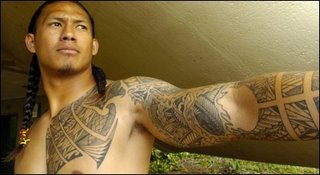 Posted on: Sunday, July 23, 2006
Posted on: Sunday, July 23, 2006 UH SUNDAY Q&A: LEONARD PETERS
Defensive back grateful for another season at UH
By Stephen Tsai
Advertiser Staff Writer
To be sure, University of Hawai'i football player Leonard Peters is trying to do the right thing.
Peters, a free safety, has never smoked or touched a drop of alcohol in his 24 years.
What's more, he performs hours of community service every week without being begged; forgives the punk who stole his prized truck; spends his free time playing with his nephews and nieces; attends church for four hours every Sunday, and won't date during football season.
"Believe me," UH assistant strength coach Mel deLaura said, "Leonard Peters is an unbelievably awesome guy."
Rich Miano, who coaches the UH defensive backs, said: "I could coach another 50 years and never have another player like him both on and off the field."
Last year, teammates voted Peters as defensive team captain.
Defensive coordinator Jerry Glanville, who refers to players by their position and jersey number, said, proudly: "I know his name. 'Leonard Peters' is the only Samoan name I know."
Peters, in fact, is a mix of Fijian and Samoan. His paternal grandfather changed his surname from "Matavau" to his stepfather's "Peters."
For now, Peters is making a name as the Warriors' defensive leader.
Last month, Peters was awarded a medical exemption that will allow him to play as a sixth-year senior this season. Peters' range, Glanville said, will enable the UH cornerbacks to play more bump-and-run, man-to-man coverages.
Peters, a graduate of Kahuku High School, has bulked up to 215 pounds, adding 15 pounds to his 6-foot-2 frame, while maintaining his quickness and improving his strength. He has run 40 yards in 4.47 seconds, and bench pressed more than 400 pounds. In the flat-bench discipline, with 135-pound dumbbells in each hand, he performed eight repetitions.
Peters works out at UH every weekday, leaving his home in La'ie before the dawn's early light. He lifts and runs in the morning, then runs again in the afternoon.
He took took a breather to answer questions from The Advertiser.
On coaching at youth camps every week:
"I always try to give back to the community and help the younger kids. I talk to them about staying away from drugs, and to listen to their coaches and parents. I want them to reach for their dreams, not let anyone tell them they can't do it just because they're from Hawai'i. It always helps to hear it from an older person who's in college, living the dream they want to get to. Sometimes it's better to hear from the student-athlete."
On just saying "no" to drugs and alcohol:
"It's a choice I made. Growing up, I didn't want to get caught up in that kind of stuff. I'm not saying I'm perfect. I just don't want to get involved in that kind of stuff. There are always temptations. People will always put pressure on you to do the wrong thing. I've been raised by good parents and in a good community. I've learned not to do those kinds of things."
On his early childhood:
"I was born in American Samoa. I remember a lot about it. I moved to Hawai'i when I was 8 years old. Samoa is beautiful. It's just like La'ie. It's country. The community is small. Everybody knows everybody there. They say you're not raised by just your family, you're raised by the village.
"In the community I lived in, you don't have to worry about people stealing. Whatever anybody has, he shares with others. You do things because you want to do them. You don't worry about getting paid back, because everybody helps everybody."
On moving to Hawai'i:
"I didn't know anything about Hawai'i. I knew it was a beautiful place. That was about it.
"My parents wanted to move to make a better life for me and my siblings. They figured by moving to Hawai'i there would be better opportunities.
"It was my first time on an airplane. It was pretty scary. I closed the windows. It was a long trip."
On breaking the language barrier:
"English is my second language. It was tough to learn. I don't think I really prepared for it. Any kid who comes from (other) Pacific Islands, you're put in what they call a step class. They teach you English and stuff like that, break it down for you a little bit slower. It was pretty hard. I used to always think in Samoan first, then try to translate it in my head. It was even harder for me in Hawai'i. It wasn't only English (spoken) where I lived. It was pidgin. You're trying to learn English and pidgin at the same time. You're trying to learn two languages instead of one.
"I learned English by watching TV, and listening and watching other people talk. I looked at their lips to see how they would make the different sounds. I would watch anything on TV. After a year or two, I started to pick it up. It's equal to me now."
On adjusting to Hawai'i:
"I remember when I moved here, I looked forward to recess, because that would be a time to make friends. I would race everybody on the field. Knowing I was a little faster, everybody would cheer for me and want to be my friend.
"I was (in a class) with the other Polynesian kids who came from Tonga, Tahiti. They were straight off the boat, as they would say. You could still smell the fish. We clicked. It was like us aliens coming to another place. We grew to be good friends."
On the Golden Arches:
"We didn't have McDonald's in Samoa. Going to McDonald's was like a field trip for us. Anytime we ate at McDonald's we were always happy. Like they say, we were like a kid in the candy shop."
On his true valentine:
"My first love was Polynesian dancing. I was about 12 when I first started dancing. There was an audition at the Polynesian Cultural Center. My mom was working there at the time as a secretary. She took us, and we auditioned. I didn't know much dancing, but I was good at following instructions.
"That was my first love. I love to go out there. I love the beat of the drums. When I hear the beat of the drums and the songs and what they represent, I get goosebumps. I just love it.
"I also do the fire-knife dance. You have to get used to the heat. That's the main thing, and getting burned. The first time I got burned, it really hurt. But I went back because I just love it. It's like in football. You get hit, but you go back again and again because you love it so much. I love performing just as much as I love football. The secret (to fire-knife dancing) is to spin it fast. Keep spinning it. If it's going fast, you don't feel it. If you stop it from spinning, you can really feel the heat. You get battle scars. It's like a sport. You get scars from playing football. You get scars from playing soccer. Everybody gets scars from fire-knife dancing."
On playing football:
"I was playing soccer at first. Then I heard about Pop Warner football. I had to beg my parents to let me play. They didn't want me to get hurt. You know how parents want to protect their kids. At the same time, I was working (as a dancer at the Polynesian Cultural Center). I had to beg them. I would ask them every night. Finally, they gave in, and it was all great."
On receiving only one scholarship offer, from UH, as a Kahuku senior:
"It didn't matter that I wasn't recruited by a big Mainland school. I wanted to stay home. I would have picked UH anyway."
On taking a semester's break before enrolling at UH:
"I made the Polynesian Cultural Center's promotion team. You get to travel the world to get people to come to Hawai'i. I went to Taiwan, Japan, Poland, Alaska. I was really lucky. How many people can say they've been to all of those places? I was working (as an entertainer), but it was a job I loved.
"Poland was beautiful. We were treated like celebrities up there. They never saw people dance with fire before. It's funny with dancing. You can connect with people, even if you don't speak the same language."
On joining the Warriors:
"I was lucky because I've always had great coaches, especially Rich Miano. I didn't know at first who Rich Miano was. I went and did some research and found out he played in the NFL for 11 years. I was excited about that. Then I learned my high school DB coach actually played with Rich Miano at UH. I've learned so much from coach Miano. He not only can coach me, he can show me what to do. Not a lot of kids get that. A lot of coaches draw things on the board. I've been fortunate to have coaches who can show me how to do drills. If I'm doing something wrong, they'll show me how to do it the right way instead of writing it on the board. They always talk about chalkboard coaching. I'm lucky to get on-the-field coaching. Coach Miano is in great shape. He works every day. He has love for the local kids. He went to Kaiser (High School). He knows what it's all about. Sometimes he'll show us tapes from when he was in college, and we'll rag on him. But he was such a physical specimen. You can see it now. He's like 40 something years old, but he can play."
On his numerous injuries:
"I don't know what it is. I just play the game. I've had (injuries to the) spleen, shoulders, knees, ankles, arms. Everything. I've been lucky. I only had one surgery, to my (left) shoulder. The rest I could recover on my own.
"When I injured my spleen (in 2003), I didn't need surgery. I ripped my spleen. It was like a freak accident. It was in training camp. One of my teammates accidentally hit me with his elbow on my side. I thought I just lost my wind. I sat out a play, and went back in to finish practice. I went to take a shower, and then I started bleeding. I checked with the trainer. I went to the hospital. They took a CAT scan, and sure enough, I was bleeding inside.
"With the (left) shoulder (in 2004), I played through the whole season. I couldn't even comb my hair (with the left hand). It got to the point where I was walking around school, and the shoulder would pop out (of the socket) on me. I would shrug my shoulder, and it would go back in. I thought, 'It's just a shoulder.' The doctors told me, 'You're going to have to have surgery.' I told them to put the brace on it, and I'll have surgery after the season. It was really hard. I remember I hurt it in the USC (road) game. We stayed up on the Mainland to play UNLV. I had to get special shoulder pads to hold my arm close to my body. Underneath that, I had a brace that would tie up. I couldn't even raise my arm. I thought I'd just play through it. I was fortunate I could finish the season. I figured if I didn't hurt my team, I would play through it."
On why he won't change his aggressive style of play:
"I play the game knowing that at any snap or any time, you can get hurt. I think that's why I've gotten hurt so much. I play as hard as I can. If I get hurt, I get hurt. I always want to play football. I'll play football until my legs fall off. If the doctors told me, 'If you take one more hit, you'll get paralyzed,' I'll play until that day comes. I love the game so much."
On receiving his medical exemption, allowing him to play this season:
"I was happy about that. A lot of people were telling me, 'The team needs you.' I don't think it was that way. I needed the team. I'm happy I can suit up one more year. A lot of people don't get cleared. I'm very grateful."
On forgiveness:
"I had a truck I loved. I dropped it. I had the rims. I changed the lines. I changed everything on the truck. It was a fast truck. Everybody knew my truck. It was different from any other truck on the road. One night, I was sleeping, and I was sleeping right in the garage. The truck was right outside. I didn't hear it start up. My mom woke me up, and said, 'Who took the truck?' I was like, 'No, I've got the keys right here.' I went outside and it wasn't there. A police officer came over and you could hear (on the scanner) another police officer following the truck. You could hear him on the radio saying, 'OK, turn down so-and-so street,' and 'He's going down the Pali,' and 'He's busting a U-turn, and is going up the Pali.' It was silent for a while, and then you hear, 'I lost him.' I'm like, 'What? You lost him?' I figured if that person was so desperate to steal my truck, he probably needed it more than I did. I know he knows who I am, because my license is in the truck. I never saw the truck again. They either chopped it up or sent it to the Mainland. I don't see it on the island."
On living in La'ie during the school year:
"I take turns driving (with teammates Tala Esera and Inoke Funaki). If you come and live in La'ie, even for one day, you'll know why I make that drive. It's such a peaceful place. And I'd rather sleep in my own bed. Even if I have to get up at 4 o'clock in the morning and drive down every day, I'll sleep in my bed. A home cooked meal after you come home from practice? You can't beat that. I'm not a freshman anymore. That dorm life, with all of that noise? I'd rather wake up (and) listen to roosters crow in the morning than hear the mopeds and the shuttles going back and forth. It's a great drive. It's not like you don't have anything to look at. There are beautiful beaches. The sun rises while you're driving. It's like a movie.
"But the gas? Oh, my gosh. They should make a special price for people who have to drive in from my side of the island. It's the cost of living, like everything else here. Milk's expensive. Food's expensive. I pay $80 to fill up my truck. I come to school. I do the errands I need to do. By the time I get home, it's at halfway already. About every other day I have to fill it up. All of my dance money is going to gas. But that's OK. I'll pay for the gas if it means I can live in La'ie."
On his golden rule:
"When I come from practice during the season, we're not to talk about football. When I'm home, with my family, I want to spend time with them. I'm sure it's the same for any other person who works in America. When they come home, they don't want to talk about work. It's the same for me. My family always wants to ask questions, like, 'Who's hurt?' I don't want to talk about it. I leave football at UH. I want to play with my nieces or nephews and enjoy my time at home."
On dating:
"No girlfriend. This is my last year. I want to focus on school and football. It's difficult. Living in Hawai'i, there are beautiful ladies everywhere. I don't want to be detoured. My mom always says I don't need a girlfriend because I have three sisters and a mom, and that's enough girls in my life."
Reach Stephen Tsai at stsai@honoluluadvertiser.com.

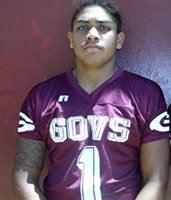
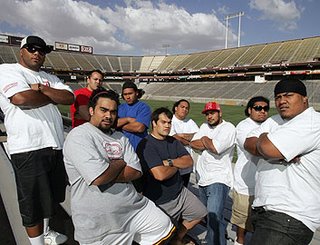
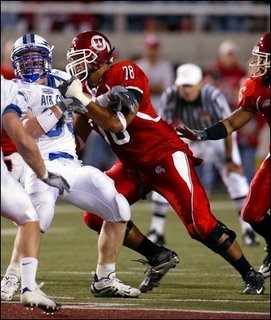
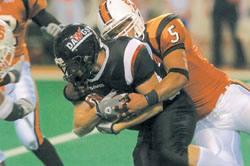
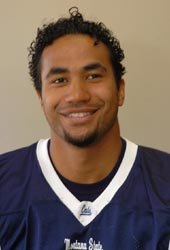
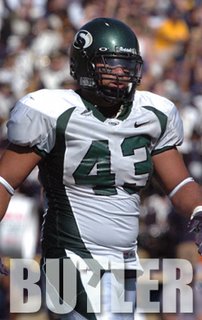

 "I got cut in my ninth grade year from varsity football and we didn’t have a JV team that year. In my sophomore year I played JV and then I played varsity my last two years. It’s pretty bad in Samoa in terms of equipment and everything because we just don’t have the funding. We would have to share helmets during games, the fields are all messed up but the kids don’t care. We just want to play. Football is like the biggest thing on the island. I’ve sent stuff back to my old high school (Fagaitua HS) because my brother (Pooch, a former linebacker at Louisiana Tech) is the coach there now and he’s always bugging me to send him stuff. He says the kids are always asking “did Travis send some stuff?” so I try to send some shorts, some shirts, stuff like that. My brother and my family tell me that everyone makes a big deal of the fact that I play for USC but to me I haven’t really done anything yet. I mean, maybe if I become a starter that would be good.
"I got cut in my ninth grade year from varsity football and we didn’t have a JV team that year. In my sophomore year I played JV and then I played varsity my last two years. It’s pretty bad in Samoa in terms of equipment and everything because we just don’t have the funding. We would have to share helmets during games, the fields are all messed up but the kids don’t care. We just want to play. Football is like the biggest thing on the island. I’ve sent stuff back to my old high school (Fagaitua HS) because my brother (Pooch, a former linebacker at Louisiana Tech) is the coach there now and he’s always bugging me to send him stuff. He says the kids are always asking “did Travis send some stuff?” so I try to send some shorts, some shirts, stuff like that. My brother and my family tell me that everyone makes a big deal of the fact that I play for USC but to me I haven’t really done anything yet. I mean, maybe if I become a starter that would be good. Out here, everything is about being on time. There wasn’t anything easy about the transition and that first year I just really wanted to go back home. Now that I’ve gotten adjusted to being our here I like the beaches, Santa Monica, the different places you can go. I like going out for Chinese food, for sushi.
Out here, everything is about being on time. There wasn’t anything easy about the transition and that first year I just really wanted to go back home. Now that I’ve gotten adjusted to being our here I like the beaches, Santa Monica, the different places you can go. I like going out for Chinese food, for sushi. "When I first got here my position coach was Ed Orgeron, crazy guy. He’s a good coach but he was really hard on me. He was hard on everybody, I don’t know, he was just a real hard coach. We’ve got Coach Holt now, he’s got kind of the same coaching style as Coach O but just not as crazy. Right now I consider my strength as a player to be my experience. I’ve been here five years and I know all the defensive plays. If I need to work on anything it would be my speed. I’ve had some ankle injuries that have slowed me down. I think I need to get stronger too. I’ve been injured for the past two spring balls and I’m recovering right now from a stress fracture but it feels good and I should be ready to go for fall camp.
"When I first got here my position coach was Ed Orgeron, crazy guy. He’s a good coach but he was really hard on me. He was hard on everybody, I don’t know, he was just a real hard coach. We’ve got Coach Holt now, he’s got kind of the same coaching style as Coach O but just not as crazy. Right now I consider my strength as a player to be my experience. I’ve been here five years and I know all the defensive plays. If I need to work on anything it would be my speed. I’ve had some ankle injuries that have slowed me down. I think I need to get stronger too. I’ve been injured for the past two spring balls and I’m recovering right now from a stress fracture but it feels good and I should be ready to go for fall camp. Favorite movie “Cinderella Man”
Favorite movie “Cinderella Man”



